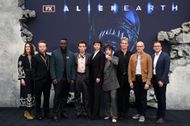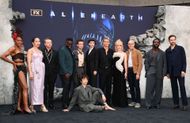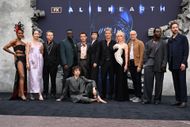Alien: Earth, Noah Hawley’s first television entry in the Alien franchise, arrived on streaming platforms in August and quickly drew strong attention from critics and viewers. The series has earned high praise on review sites and registered millions of streams across Disney+, Hulu, and FX shortly after its debut.
The fact that his work was well-received prompted Hawley to discuss what he attempted to do with the show and how he approached a story that draws upon a long-running film legacy. Noah Hawley stated that he aimed to recreate the mix of awe and fear he felt watching the original films, while adjusting the tone and pace so that the series would stand on its own.
He also focused on character choices and story structure, not just the creature effects that fans expect. His comments came as the series was being discussed as one of the most talked-about entries in the franchise.
Noah Hawley aimed to mirror the original emotional tone

Noah Hawley said that he wanted viewers to feel the same emotional pull that he experienced from the first two Alien films. He described the original Alien as tightly made and pointed to the final act as an example of mounting, step-by-step tension.
In an interview with ScreenRant, rather than aligning with the films, Hawley said he reversed their rhythm. The series “Alien: Earth” opens with more action and later shifts into slower, more frightening scenes, so the return of the creatures matters more when it happens.
Alien: Earth adds new ideas while keeping ties to the films

The story takes place in the pre-1979 timeline, and its characters and themes are new to the franchise. Alien: Earth is a commentary on corporate authority, the issue of identity, and a pilot project on artificial life, as well as a wink to the original design philosophy.
Hawley and his team struck a balance between those aspects, making the show feel closer to long-term fans without being redundant to those new to Alien.
Critics gave strong reviews, and audiences tuned in

Critics gave Alien: Earth unusually high scores for a recent Alien project, and review aggregates listed the show among the franchise’s best-reviewed entries. One widely cited report put the series’ Rotten Tomatoes rating in the high 80s to mid-90s range, reflecting a strong critical response.
Audience numbers supported that critical interest. Disney’s internal tallies and industry reports showed that the premiere garnered approximately 9.2 million views across streaming platforms in its first six days, indicating that many viewers clicked on the series soon after it launched. Those figures cover streaming only and do not count the series’ linear broadcasts on FX.
Noah Hawley’s response focused on characters and structure

Noah Hawley responded to the strong reviews by highlighting the show’s structure and its characters. He said the middle episodes make the audience care about the people and their dilemmas even when the alien threat is not present, which then raises the stakes when the creatures do appear. That emphasis on human conflict and pacing, he suggested, is why Alien: Earth connected with both critics and many viewers.
Noah Hawley’s Alien: Earth has been treated as a notable TV entry in a long-running film series. The show’s combination of early action, later horror, and attention to character earned wide attention from reviewers and viewers alike.
Hawley’s public remarks underscore that his goal was not to replicate the films but to utilize the franchise’s tone, design, and threat to tell a story that works on television.
